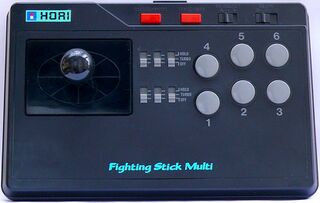Difference between revisions of "Fighting Stick Multi"
From Sega Retro
(Added release data from archived HORI site.) |
Scarred Sun (talk | contribs) m (Text replacement - "Physical Scans" to "Physical scans") |
||
| Line 16: | Line 16: | ||
The Fighting Stick Multi is a six button stick with some turbo options. Each console needs its own set of leads in order to use the device. The Fighting Stick Multi was only released in Japan, although the similar [[Fighting Stick Dual]] was later released in North America, which only supported the Genesis and Super NES (since the TurboGrafx-16 was not as successful outside Japan), but was a more economical alternative. | The Fighting Stick Multi is a six button stick with some turbo options. Each console needs its own set of leads in order to use the device. The Fighting Stick Multi was only released in Japan, although the similar [[Fighting Stick Dual]] was later released in North America, which only supported the Genesis and Super NES (since the TurboGrafx-16 was not as successful outside Japan), but was a more economical alternative. | ||
| − | ==Physical | + | ==Physical scans== |
{{Scanbox | {{Scanbox | ||
| console=Mega Drive | | console=Mega Drive | ||
Revision as of 16:53, 21 March 2016
| This file or page has been flagged for relocation to Retro CDN, the Wikimedia Commons-esque service for all Retro wikis. This message is for the benefit of Sega Retro wiki staff. |

| |||||
| Fighting Stick Multi | |||||
|---|---|---|---|---|---|
| Made for: Sega Mega Drive | |||||
| Manufacturer: Hori | |||||
|
This teeny-tiny article needs some work. You can help us by expanding it.
The Fighting Stick Multi is a third-party arcade stick manufactured by Hori. It is compatible with multiple consoles, namely the Sega Mega Drive, Super Famicom and PC Engine, hence the "multi" name.
The Fighting Stick Multi is a six button stick with some turbo options. Each console needs its own set of leads in order to use the device. The Fighting Stick Multi was only released in Japan, although the similar Fighting Stick Dual was later released in North America, which only supported the Genesis and Super NES (since the TurboGrafx-16 was not as successful outside Japan), but was a more economical alternative.

